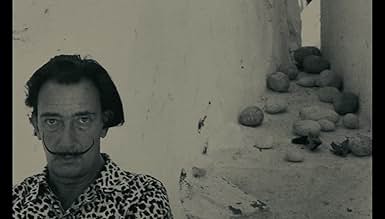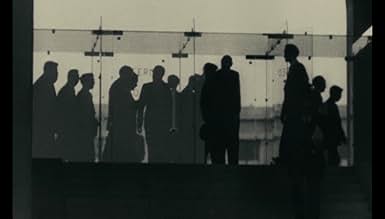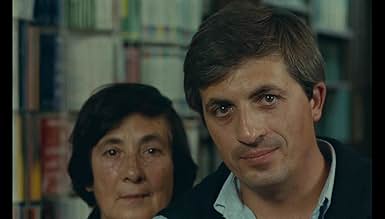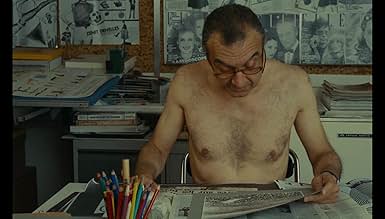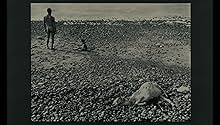Agnès Varda interviews two subjects from a photograph she took 30 years earlier.Agnès Varda interviews two subjects from a photograph she took 30 years earlier.Agnès Varda interviews two subjects from a photograph she took 30 years earlier.
- Awards
- 1 win total
Ulysse Llorca
- Self
- (as Ulysses Liorca)
Charles de Gaulle
- Self
- (archive footage)
- (uncredited)
Agnès Varda
- Self - Interviewer
- (voice)
- (uncredited)
- …
- Director
- Writer
- All cast & crew
- Production, box office & more at IMDbPro
Storyline
Did you know
- ConnectionsEdited into Cinévardaphoto (2004)
Featured review
Varda is in her fascinating best here. In Documenteur a year before, she allowed herself to be submerged in the swirl of emotions, looking for entry into life that eluded her. It was perhaps a difficult time for her. Here she is absolutely crackling by contrast, erudite and playful.
She is again looking for entry, she finds it in an image, an old photo she took in '54. It shows a naked man looking out to sea, a boy, a dead goat, in a beach, evocative in its own right of ambiguous yearning for communion. But it becomes now a center for her, an opportunity to find entries of all sorts in the life behind images.
She finds the naked man again. She finds the boy, now a grown man with a family of his own, who has no recollection of posing for it. The most haunting thing, the boy had painted a drawing that Varda has kept, depicting the very same scene; in the painting the boy is touching the man.
She finds her own past of taking photos that spring of '54, we see a few. Through these, an opportunity to recall names and faces in her street, a mini-history in one place. Curious of what was going on in the world while she was snapping that photo, it now becomes an opportunity to revisit history, defeat in Dien Bien Phu that May, DeGaulle in Paris.
The image is taken and shown to kids, the kids asked what they think. Asked to compare it with the painting, they seem to prefer the photo, finding it more real. It had been staged by Varda of course, a product of the imagination. But the staging now, all through this, acquires gravity because it points to real things. This isn't just a photo Varda staged, it's one she really took that day.
And onwards it becomes an opportunity to weave small narratives of all sorts, about Ulysses, goats, contextual placement of the eye. All this is teased out in a playful way, as possible ribbons, for the joy of the image allowing these inroads; none of Godard's desire to stultify and provoke for Varda who is a calm soul.
It all points to how the image is pliant, a field where memories and narratives intersect. Some of these she has just improvised for us.
She is again looking for entry, she finds it in an image, an old photo she took in '54. It shows a naked man looking out to sea, a boy, a dead goat, in a beach, evocative in its own right of ambiguous yearning for communion. But it becomes now a center for her, an opportunity to find entries of all sorts in the life behind images.
She finds the naked man again. She finds the boy, now a grown man with a family of his own, who has no recollection of posing for it. The most haunting thing, the boy had painted a drawing that Varda has kept, depicting the very same scene; in the painting the boy is touching the man.
She finds her own past of taking photos that spring of '54, we see a few. Through these, an opportunity to recall names and faces in her street, a mini-history in one place. Curious of what was going on in the world while she was snapping that photo, it now becomes an opportunity to revisit history, defeat in Dien Bien Phu that May, DeGaulle in Paris.
The image is taken and shown to kids, the kids asked what they think. Asked to compare it with the painting, they seem to prefer the photo, finding it more real. It had been staged by Varda of course, a product of the imagination. But the staging now, all through this, acquires gravity because it points to real things. This isn't just a photo Varda staged, it's one she really took that day.
And onwards it becomes an opportunity to weave small narratives of all sorts, about Ulysses, goats, contextual placement of the eye. All this is teased out in a playful way, as possible ribbons, for the joy of the image allowing these inroads; none of Godard's desire to stultify and provoke for Varda who is a calm soul.
It all points to how the image is pliant, a field where memories and narratives intersect. Some of these she has just improvised for us.
- chaos-rampant
- Jun 22, 2015
- Permalink
Details
- Release date
- Country of origin
- Language
- Also known as
- 尤里西斯
- Production company
- See more company credits at IMDbPro
- Runtime22 minutes
- Color
- Sound mix
- Aspect ratio
- 1.66 : 1
Contribute to this page
Suggest an edit or add missing content


